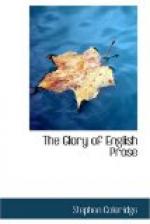The august shadow of the Bible is dimly apprehended as the words ascend upwards and upwards with simple sublimity to the awful close.
Nothing he wrote in all his multitudinous volumes surpasses this astonishing outburst:—
“Beautiful Highborn that wert so foully hurled low!
“For, if thy being came to thee out of old Hapsburg Dynasties, came it not also out of Heaven? Sunt lachrymae rerum, et mentem mortalia tangunt. Oh! is there a man’s heart that thinks without pity of those long months and years of slow-wasting ignominy;—of thy birth soft-cradled, the winds of Heaven not to visit thy face too roughly, thy foot to light on softness, thy eye on splendour; and then of thy death, or hundred deaths, to which the guillotine and Fouquier Tinville’s judgment was but the merciful end?
“Look there, O man born of woman! The bloom of that fair face is wasted, the hair is grey with care; the brightness of those eyes is quenched, their lids hang drooping, the face is stony pale as of one living in death.
“Mean weeds which her own hand has mended attire the Queen of the World. The death-hurdle, where thou sittest pale, motionless, which only curses environ, has to stop—a people drunk with vengeance will drink it again in full draught, looking at thee there. Far as the eye reaches, a multitudinous sea of maniac heads, the air deaf with their triumph-yell!
“The living-dead must
shudder with yet one more pang; her startled
blood yet again suffuses with
the hue of agony that pale face,
which she hides with her hands.
“There is, then, no heart to say, ‘God pity thee’?
“O think not of these: think of Him Whom thou worshippest, the Crucified—Who also treading the winepress alone, fronted sorrow still deeper, and triumphed over it, and made it holy, and built of it a Sanctuary of Sorrow for thee and all the wretched!
“Thy path of thorns
is nigh ended. One long last look at the
Tuileries, where thy step
was once so light—where thy children
shall not dwell.
“Thy head is on the
block; the axe rushes—dumb lies the world;
that wild-yelling world, and
all its madness, is behind thee.”
There is a passage in Carlyle’s tempestuous narrative of the taking of the Bastille which has always seemed to me to give it the last consummate touch of greatness.
Suddenly he pauses in the turmoil and dust and wrath and madness of that tremendous conflict, and his poetic vision gazes away over peaceful France, and he exclaims:—
“O evening sun of July, how, at this hour thy beams fall slant on reapers amid peaceful woody fields; on old women spinning in cottages; on ships far out on the silent main; on balls at the Orangerie of Versailles, where high rouged Dames of the palace are even now dancing with double-jacketed Hussar-officers:—and also on this roaring Hell-porch of a Hotel de Ville.”
And a few sentences further on a heart of stone must be moved by what the archives of that grim prison-house revealed:—




